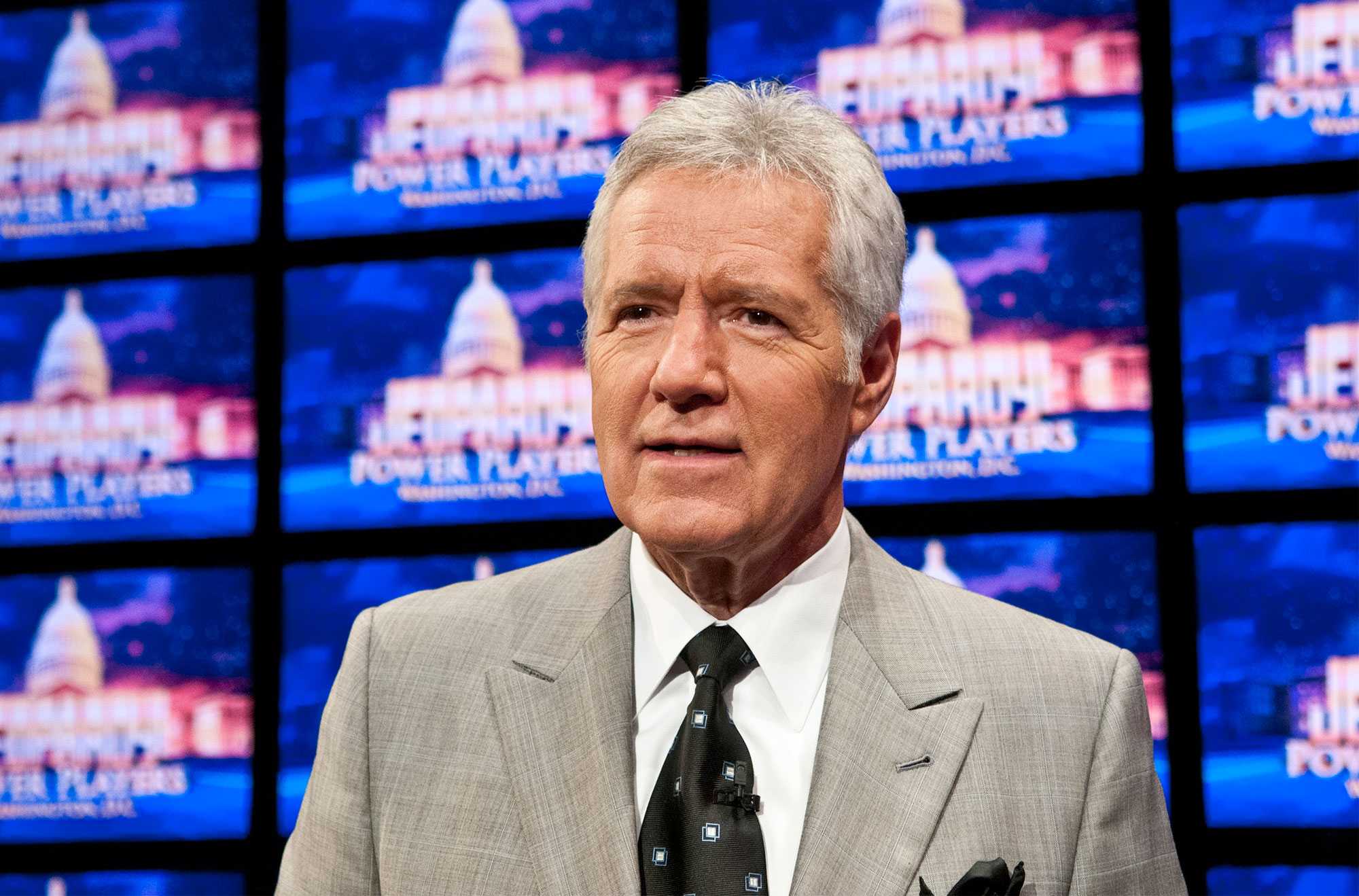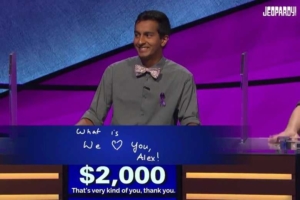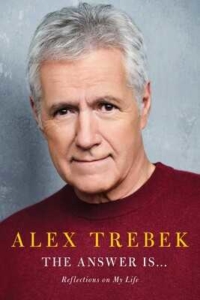Trebek Memoir: Reflections on My Life
Topic: Real Talk: Survivor, Patient & Family Stories

By Caitlin Kelly – July, 31, 2020
When you think of historic moments on Jeopardy, it’s usually the final and shocking defeat of a legendary champion, like “Jeopardy James” Holzhauer or Ken Jennings, who each won millions after weeks of play.

But it was a soft-spoken college undergraduate from Gainesville, Ga., Dhruv Gaur, whose spontaneous gesture of compassion and kindness during the November 2019 Tournament of Champions is one millions–including Jeopardy’s urbane host Alex Trebek, who has Stage IV pancreatic cancer—won’t soon forget. At the time, Gaur knew Trebek had recently required additional chemotherapy.
While playing the game, which aired Nov. 11, 2019, Gaur noticed Trebek, whom he’d admired since childhood, seemed less than his usual calm, composed self.
“He looked visibly, definitely a little bit down on himself, a little harder on himself,” says Gaur, a senior studying economics and public health at Brown University, who qualified for the Tournament of Champions through four wins in the qualifying college competition. Having already won $100,000 from his previous wins and knowing he was about to lose this final game, Gaur said he thought to himself, why not go out with a loving, unusual gesture?
Instead of scribbling some final guess, Gaur wrote: “We (heart) you Alex.”
He hadn’t planned it at all, he recalls: “I wanted to do a nice thing.” When Trebek reacted, visibly moved and surprised, “I honestly found it unexpected,” Gaur says, “because he’s so polished.” That led to an appearance on the Ellen DeGeneres show and a $25,000 donation for the Lustgarten Foundation from Shutterfly. But Gaur and his fellow competitors—who each wore a purple ribbon to honor both Trebek and Teachers Tournament winner Larry Martin, who died of pancreatic cancer earlier that year—also took to social media urging Jeopardy viewers playing along at home to donate $1 or more for every correct answer. The spontaneous campaign raised a total of nearly $100,000. “It turned out to be really hugely successful. I’m really proud of what we achieved.”

That moment of authentic, unscripted surprise and emotion—and the public’s outpouring of support in response—was one of the reasons Trebek finally answered the call from fans and publishers alike to write about his life.
Earlier this summer, on the eve of Trebek’s 80th birthday on July 22, his memoir hit bookshelves. “The Answer Is…Reflections on My Life,” is dedicated to “those who are hoping to become survivors.” Like the man himself, the book is quiet, modest, reticent. “I’ve never seen myself as anything special,” writes Trebek, who has hosted Jeopardy since 1984, winning 35 Emmys. He’s also candid, at the very start, about how life has changed for him since his diagnosis and treatment. “The cancer, chemotherapy and my age have taken a toll on me,” he admits.
He tells no dishy Hollywood tales, but in short chapters, offers many glimpses into a life that began in Sudbury, a small mining city in northern Ontario, Canada, where his father, a Ukrainian immigrant, worked at the local hotel, the Nickel Range. George Terebeychuk was a chef, and “the kitchen became my second home where I learned the value of the little things in life: the importance of punctuality; the rewards for hard, honest work,” Trebek writes.
Jeopardy fans have noticed the relish with which he delivers any clue with French words—his mother was French-Canadian, and he is fluently bilingual. He was an initially rebellious student until a mentor at the University of Ottawa boarding school took him under his wing.
Trebek began working as a radio announcer while still in university then went on to work for the Canadian Broadcasting Corporation, but—like some other ambitious Canadians—began looking south for greater and more lucrative opportunities in television. That meant having seven jobs in 10 years, shuttling between Los Angeles and Toronto. His mother, after divorcing his father, lived in the United States, as did her sisters. “America,” Trebek writes, “was a whole new world of affluence to me.”
As he faces his own cancer battle, now into his second year as a survivor thanks to improvements in treatment made possible through research funded by the Lustgarten Foundation, Trebek knows Jeopardy offers its viewers worldwide something we all crave, especially now–comfort. “I think the biggest reason the show has endured is the comfort it brings,” he writes. “Viewers have gotten used to having me there, not so much as a showbiz personality but as an uncle. I’m part of the family…They find me comforting and reassuring as opposed to being impressed by me…I’m a second-tier celebrity.”
The book focuses much more on his life and his family—his wife Jean and his children, Matthew and Emily—than on his cancer, only really discussing it near the book’s end. “I’d like to be a noble leader,” he says of his role as the most public face of pancreatic cancer survivorship. “I know that’s how others see me: as this compelling, brave leader.”
Trebek feels the weight of others’ hope for him, and for their own situations.
He candidly admits: “The longer I’ve lived with the cancer, the more my definition of toughness has changed. I used to think not crying meant you were tough. Now I think crying means you’re tough. It means you’re strong enough to be honest and vulnerable. It means you’re not pretending…If that’s a way for you to inspire people, then there is a lot of merit in that.”
The book also offers fun insights into his life and work – from images of him on the set to a shot of his desk with all its notes, using a crayon to cross off the clues he’s already done since the microphone can’t hear it. He’s still working the required eleven-hour days because the show is taped in two days, five shows per day, with only 15 minutes between each game, and he still enjoys the occasional KitKat chocolate bar and Diet Pepsi.
Having so much work “invigorates me,” Trebek writes. “There are days I’m just a basket case before we tape. I can barely walk to the production meeting. But when Johnny [Gilbert] introduces me and I get out onstage, it all changes suddenly. I’m myself again…No matter how I feel before the show, when I get out there it’s all forgotten because there’s a show to be done. Work to do.”
“There are days I feel like Mike Tyson just dropped to the canvas by a Buster Douglas uppercut. But it is by no means a fair fight…Yet I still believe in the will to live. I believe in positivity. I believe in optimism. I believe in hope, and I certainly believe in the power of prayer.”
Did You Know:
When Gaur penciled in his now famous phrase “We (heart) you, Alex,” he was responding to a Final Jeopardy clue from the category “Famous Phrases.” The clue was, “In the title of a groundbreaking 1890 exposé of poverty in New York City slums, these three words follow ‘How the.’ ”
The correct answer was: How the Other Half Lives: Studies among the Tenements of New York by Jacob A. Riis

